Daughter of the legendary and veteran parliamentarian, Late Somnath Chatterjee, musician and social activist Anushila Basu talks about music, Rabindranath, and more – exclusively for Different Truths.
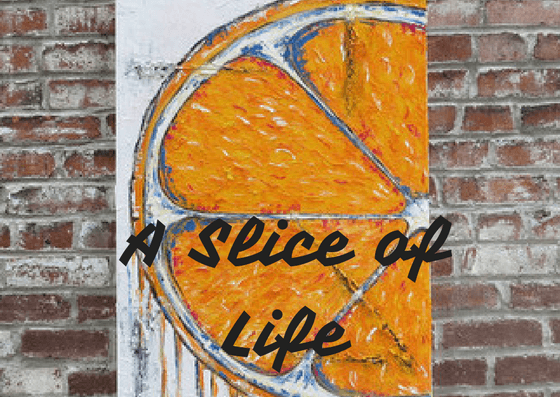
Anushila Basu is forever active and busy since she simultaneously has her fingers in so many pies. Daughter of the legendary CPM stalwart and veteran Parliamentarian Late Somnath Chatterjee, she is a talented singer, social worker, and passionate women’s activist all rolled into one. A splitting image of her famous father, the tall and large lady is easily recognisable by her trademark large bindi and eye-catching colourful saris as she enthusiastically shuttles between her home in a country home in Shantiniketan, Bolpur and Kolkata, which is the nerve centre of all her activities. Her high profile notwithstanding, she appeared rather down-to-earth and easily accessible.
Ruchira: Being the daughter of a legendary politician and veteran Parliamentarian Somnath Chatterji, how come you chose to stay away from politics and pursue music instead? Was there music in the family?
Anushila: My father’s family has been inseparable from politics and the legal profession. My brother, Pratap Chatterji, is the third generation legal practitioner in the family. However, as is the common trait in average Bengali homes, we kids were persuaded to try our hand at music, dance etc. My sister, Anuradha, was an artist.
Ruchira: Please trace your musical career graph for us.
Anushila: Back in the 1980s, when I was studying law at Calcutta University, Bani Thakur and I lived opposite Hazra Law College. I was enrolled there. At that time, she was one of the most celebrated artists of Rabindra Sangeet. I visited her with a friend and was utterly charmed by her behaviour and conduct. Those days I did sing casually under the guidance of Amiya Roy but getting introduced to Bani di transformed my entire focus and outlook towards music, and I got immersed in this enchanting world of music and became a member of Bani di’s musical consortium, Kinshuk.
While I was associated with Kinshuk, I had the opportunity to perform alongside many legendary artists like Hemanta Mukherjee, Kanika Banerjee, and Sanjukta Panigrahi (danseuse), to name a few. Knowing them so closely ignited in me a new lease on life; since then, I have fallen more in love with music. For some reason, Bani di greatly trusted my opinions and would leave much planning and detailing of her functions to me. I started to get addicted to this process, and when Bani di stopped taking classes, I started my school, called Kalabhrit, on Bondel Road, Kolkata.
Ruchira: What is Tagore and Rabindrasangeet to you?
Anushila: To aptly sum up my views, I will borrow a few lines penned by the poet himself: Ami tomake peyechhi hridaya majhe, Aaron Picchu Nahi chair go (Thou art ensconced within the depths of my; how can I, therefore, crave for anything else?) Tagore once said, “My poems without their melodies are like butterflies without wings.’’ Tagore composed a vast body of incredibly ‘poetic’ songs based on Indian Classical Ragas and Western folk tunes, which are heard worldwide in every Bengali home.
Ruchira: Please describe some memorable performances, albums, CDs, etc.
Anushila: I have performed in various places, but the highlight of my musical career is the two solo albums I released. Je Achho Antara, Jyoti Basu, the erstwhile Chief Minister of West Bengal, released the first album. What is even closer to my heart, my father did the narration between the songs. The next album, Tomar Akash Dao, was released in Shantiniketan by Javed Akhtar and Shabana Azmi. In addition to my songs interspersed with my father’s narrations, this album also contains English recitations of Rabindranath Tagore’s poems by Shabana Azmi.
I worked with Paschim Banga Rajya Sangeet Academy for five years and wrote a paper on Bengali music from 1900-1947. Dr Ratna Bhattacharya mentored me, and this was later published as a book, something I am very proud of.
I have visited the USA thrice and performed in Detroit, Atlanta, and California. I have also performed in Dhaka, Tripura, and several times in Delhi – solo and with my group. The former Chief Minister of Delhi, Sheila Dikshit, inaugurated some of these programmes.
I am also happy to say that many of our students have graduated and done well in their respective careers, with some even opting to join back as teachers. I feel this is a massive achievement for all of us.
In most of our shows, we have nearly 50-60 performers, even as many as 125 in one of our recent productions. On Rabindranath Tagore’s 150th birth anniversary, 150 of us performed 10 of his songs to a packed house at Rabindra Sadan. Another proud moment for us!
On 15th August 2022, we staged a mega show Bharata Bhagya Bidhata at ICCR Kolkata. Not many groups work with live music, but live bands still perform all our background scores, and I believe that is something that sets us apart. You can always find our band singing and playing alongside the dancers on stage.
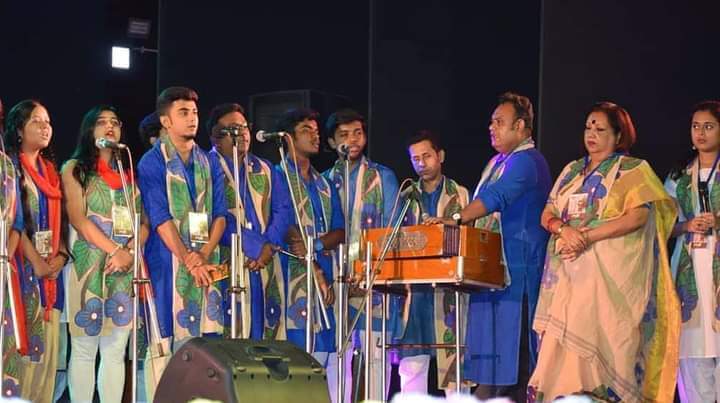
Ruchira: Please describe in detail Kalabhrit, your brainchild.
Anushila: At Kalabhrit, we teach singing, dancing, art, and playing instruments, e.g., tabla, synthesiser and others, and several other disciplines. We regularly put on shows. And watch little children grow through this journey is something I feel immensely proud of.
This led me to want to do even more and thus was born KPPTP- Kalabhrit Parashmani Pashe Thaka Prayash. We organise donation drives to aid the masses living in areas which are hard hit or ravaged by natural (or artificial) calamities and have been successfully helping some communities over the years. For example, we created kits for nearly 300-400 families affected by the cyclones Amphan and Yaas. We visited the affected areas several times to donate basic survival kits. In Kalabhrit, we have conducted various workshops that have never happened in Kolkata. For instance, we conducted musical workshops with noted Bangladeshi Rabindrasangeet artist Rezwana Choudhury Banani, Odissi dancer Sanjukta Panigrahi, singers Kanika Banerjee, Manna Dey and renowned folk singer Amar Pal. Many students from within our school and outside attended these workshops.
The four-storey Kalabhrit building has been adorned with folk art, including the famous Bengali Pata Chitra. The artists were brought from Medinipur, and every drawing has a story behind it. I believe this is a unique feature of Kalabhrit.
Our costume has also been designed with Bengali folk art in mind. We support and promote local and traditional art forms and artisans.
I am happy I have been able to do some such little things that are very dear to me. I used to love table tennis, played competitively in college, and sang semi-professionally. I feel privileged to share the same with a broader group of people, thanks to Kalabhrit.
Ruchira: What is Purnimar Potli all about?
Anushila: Purnima Potli is also such an initiative on behalf of Purnima, a survivor of domestic violence. We sell saris and jewellery made by her, and the proceeds go towards supporting her and her young daughter. We are also working on setting up a small shop for her in Medinipur, and any support towards this cause will be very much appreciated.
Ruchira: What other social welfare initiatives are you associated with?
Anushila: We have helped educate some other young girls from Medinipur and rural areas so that they become self-sufficient in life. One of them is now a graduate of a beauty school and has started a small hair styling and treatments business.
We also champion a Go Green cause where we educate people on the importance of living a sustainable lifestyle, encourage them to reduce plastic use, and move towards more eco-friendly options like reusable bags, water bottles, etc. Not everyone has the space or chance to plant many trees, but we can still try to do our bit within our limited capacities. We have created a small terrace garden on the roof of the Kalabhrit building, where we have about 300-400 plants, which brings some joy to people who cannot visit open green spaces easily.
Additionally, we try to support some small Tribal settlements in Shantiniketan, Bolpur, by providing them access to medicines. We have donated warm clothes, sewing machines, wheelchairs, tricycles, books and stationery in various areas according to their specific requirements.
I am a big fan of Mohun Bagan Club and fought with them over their policy of having only male members. I am proud to say that membership now extends to women as well, and I happen to be the first female member of this club after a battle of 4-5 years!
Thanks to Kalabhrit and its students, we have reached beyond what we could have individually. When students have birthdays, we ask them to donate notebooks and stationery items which we pass on to the less privileged individuals. The students and their families are always excited to help and donate wholeheartedly.
Ruchira: What are your notable contributions/ initiatives towards uplifting the Economically Weaker Sections (EWS)?
Anushila: We also have many initiatives for women only. However, I believe that men are equally affected in some cases, and we try to help those who need help, their gender notwithstanding. In Pinglathana (W Medinipur), 90% of the painters (aka Patras) were severely affected due to the pandemic situation and were unable to sell their products. Since they were not directly affected by the cyclones that ravaged Bengal, they did not receive much aid either. But their livelihood was still involved. We have helped them also.
Wherever possible. Whether we did it through donations or employment depended on the situation.
Ruchira: Do you have any plans for the anvil?
Anushila: Around Durga Puja this year, 60 of us will be staging Mahishasura Mardini at the ICCR Auditorium Kolkata. Mahishasura Mardini is something very nostalgic and close to the hearts of most Bengalis, having grown up listening to it on the radio. We will be performing the version by Birendra Krishna Bhadra.
Ruchira: How does it feel to be the daughter of a political stalwart?
Anushila: I was hailed as the daughter of Somnath Chatterjee. It fills me with a sense of pride and confidence. My paternal grandfather N C Chatterjee, too, was a formidable barrister and politician in an era when politics was considered a means to serve the nation. I would also like to mention that my maternal grandfather, Raja Rao Dhirendra Narayan of Lalgola (Murshidabad), was a musical connoisseur. It is not easy to live up to the expectations of friends, relatives, and acquaintances without harming the immense family prestige built up by our parents.
Nonetheless, our childhood was as simple as can be. We were not to consider ourselves ‘entitled’. I remember my grandmother, Binapani Debi, chopping vegetables for the family’s meals. It was the norm in middle-class households during those days. On the other hand, our little successes in life did not get recognition as they were considered as results of ‘contacts.’ Nonetheless, it is a small price to pay for belonging to a family known for its principles and hard work over more significant parts of the country.
Ruchira: Looking back at life, what do you feel are your achievements?
Anushila: I have grown up watching my parents constantly trying to help those less unfortunate than themselves, which is probably why I feel the urge to carry this tradition myself. I feel at peace when I can do this. Whatever little I’ve achieved is due to the blessing of my parents and my gurus. And, of course, I am very fortunate to have a supportive husband, Debi Prosad Basu (an entrepreneur, an avid social worker, an active Rotarian and more). He is equally passionate about these causes. He is my pillar of strength.
Photos sourced by the interviewer.

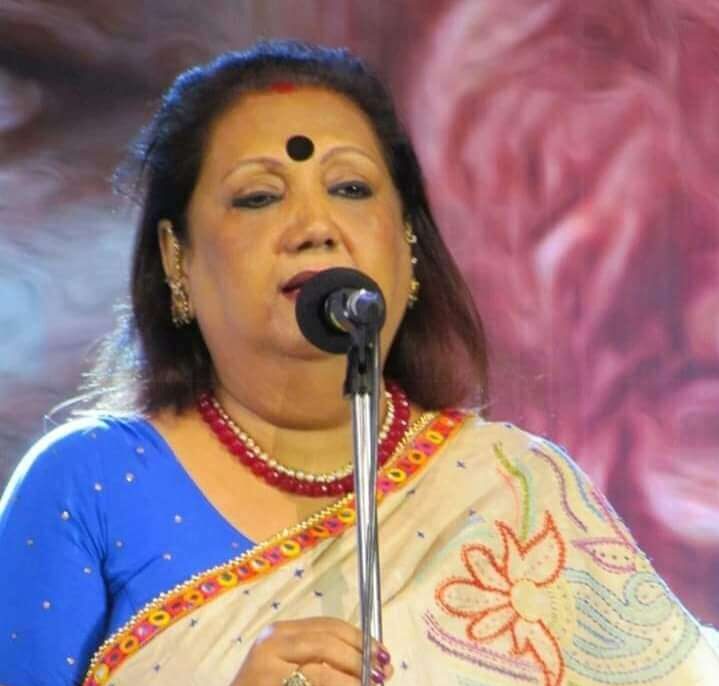
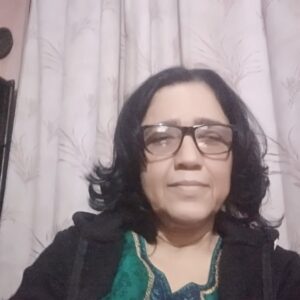


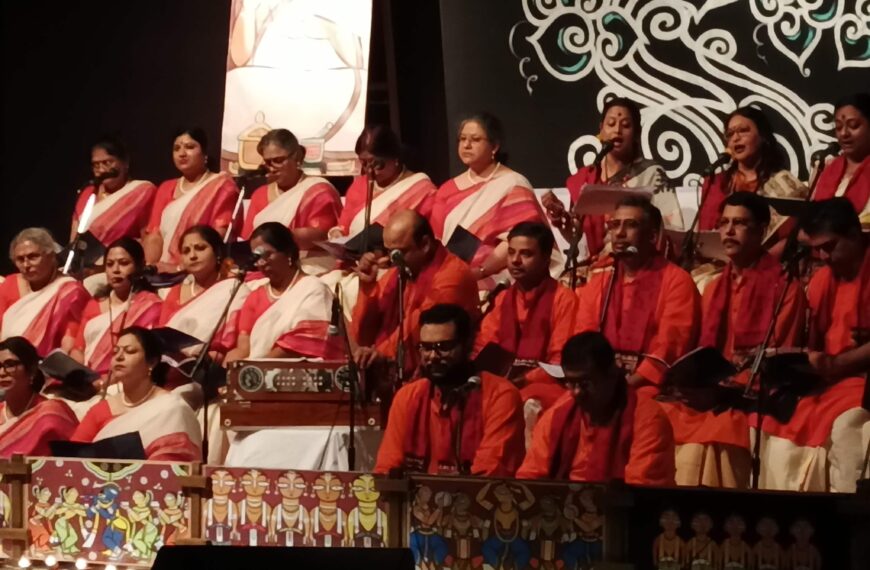
 By
By
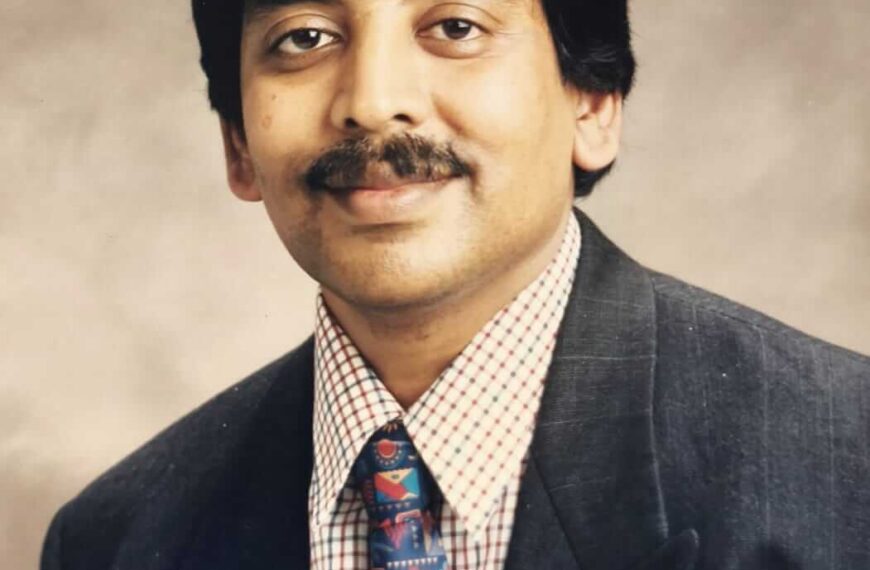
 By
By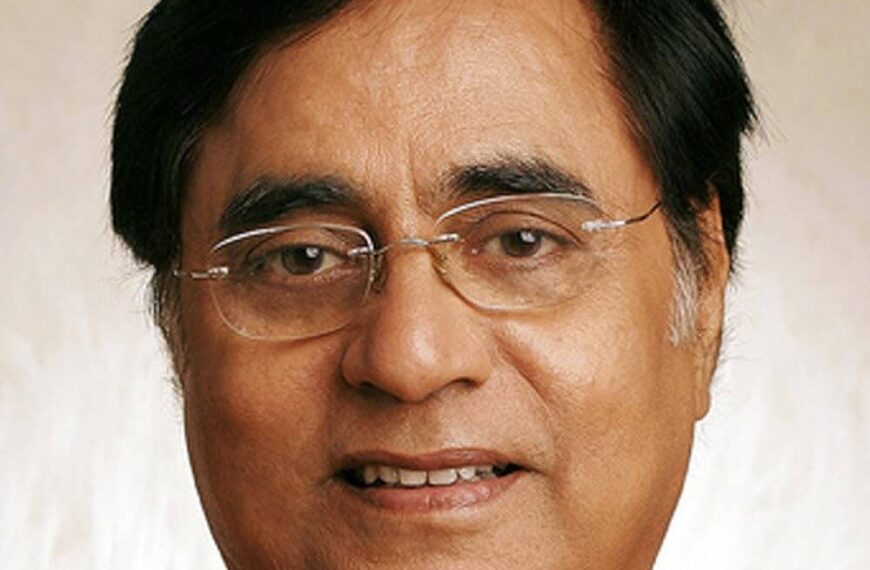
As a student of Anushila Di ‘s institution and a member of KPPTP , I am impressed to read this. I am really inspired by Anushila Di ‘s work and always try to be with her in her service to the less fortunate people of our society. My heartiest regards and love towards Anushila Di.